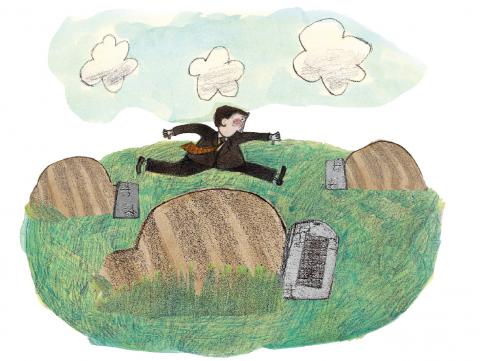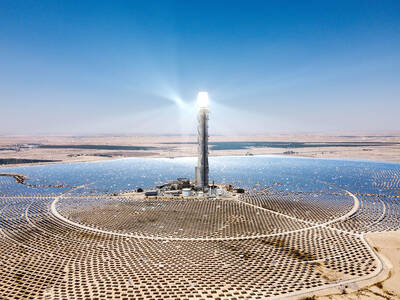I am an American who has lived in Taiwan for 15 years, and I have had lots of evocative experiences during this time. My problem is, where to begin? I have related my story in my book Something Super: Living, Learning and Teaching in Taiwan, which was kindly reviewed by this paper. So I have told most of my tales of teaching, interacting with students, learning language, participating in Taiwanese politics, going to school, volunteering and the like.
For this piece, I would like to focus on a small event that occurred a few weeks ago. This event, as many others I have attended in Taiwan, was a mixture of both cultural inspiration and a dose of culture shock.
On that day, I traveled with my Taiwanese wife to Miaoli, to the south of Taipei to participate in a tomb sweeping activity. This was slightly different from the normal Tomb Sweeping Day (清明節) — not only did it take place two weeks after the end of the Lunar New Year (a day chosen out of convenience for some participants), but it was also seen through a Hakka cultural lens, as opposed to the normal Chinese festivity.

GRAPHIC: Y.C.CHEN
GRAVES, GRAVES EVERYWHERE
The weather that day was fine, and visitors to Taiwan are familiar with the pleasant green setting in Miaoli. We arrived carrying a heavy load of foodstuffs, to be placed around the tombs of my wife’s great-grandfather, grandfather, and grandmother. Upon arriving I was the only foreigner in the crowd, which always sets the participants tittering and talking under their breath — politely of course. Soon, I was overhearing my name, and “David’s doing...” (大為在做。。。) and “David said...” (大為說。。。) sifted through the group. I didn’t attempt to speak much Mandarin and I regretted this, but everyone was perfectly nice to me.
The tombs were located in almost remote areas in the hilly locale. I observed and participated in all of the funerary rites with grave respect, immersing myself in this cultural awakening. I took part in the principal prayer ritual twice with my wife and once with one of her relatives. “Bai bai” (拜拜) is phrase you hear over and over again at Tomb Sweeping, and people pray in order from oldest to youngest. We stood before the graves and bowed three times. This process was then repeated three times. We were asked to splash a small glass of alcohol onto the gravestones, which was done in order to placate the dead.
The rituals took place in two principal spots: at the grave of the deceased person, and a small Earth God stone nearby, which guards the grave. Masses of incense were lit, and I found myself holding four or five sticks at a time, and giving them back to the hosts as prayers were recited. These were in turn stuck into the ground near the headstones.
As is often the case, the first two graves were large structures with semi-circular yard areas in front. A leaf of yellow paper money under a stone is placed on top of each grave, which identifies it as actually housing a deceased person, rather than an empty site. Foodstuffs were placed around the front, and particularly the chicken (with the head of course), pork and fish must be placed in exactly the right positions. As the relatives walked about, I noted that a few people seemed to be sweeping the area and I wished I could locate a broom to do my part.
The culture shock hit when we arrived at the third and final grave, that of my wife’s grandmother. I saw that the cemetery was covered in thick weeds and paper money was scattered around on the graves, as part of the ritual. This made me uncomfortable. My wife later explained this was because the cemetery was not truly permanent, but a “temporary” grave site where people are buried and left to decompose for a few years, before their remains are gathered and transferred to permanent locations. So her grandmother, who was located under nothing more than a mound of earth in this cemetery, would soon be transferred to the tomb of her husband up in the hills.
SEEING THE LIGHT
Throughout these ceremonies I felt a feeling I have often felt in Taiwan — being a new person in a new culture, surrounded by a new language (though I can hardly call Mandarin “new” any more), and baptizing myself in new, sometimes strange, usually fascinating, always enlightening ceremonies, rituals and cultural patterns.
I am sure almost every foreigner in Taiwan would agree that this is one of the joys of life overseas. At times it can be troubling, but even small events like this one are windows into something grand, edifying and uplifting — something we expatriates know, which few of our own relatives back home can ever experience.
Steinbeck said it well, and his words open my eyes to all I have experienced in Taiwan: “A kind of light spread out from her. And everything changed color. And the world opened out. And a day was good to awaken to. And there were no limits to anything.”
Light, color, a new world, an awakening, no limits. That has been my life in Taiwan, right down to the little things.
TELL US YOUR STORY:
Perhaps you are getting your pilots license or volunteering with children or have been involved in the nation’s social movements over the past decade. Beginning today, the features section will publish Taiwan Tales, a monthly, reader-generated column by resident expats keen to share evocative experiences about living in Taiwan. Stories can take the form of memoir, analysis or reminiscence. Submit your personal anecdote of original writing between 700 and 1,000 words, along with your name, address and phone number, to features@taipeitimes.com.

Google unveiled an artificial intelligence tool Wednesday that its scientists said would help unravel the mysteries of the human genome — and could one day lead to new treatments for diseases. The deep learning model AlphaGenome was hailed by outside researchers as a “breakthrough” that would let scientists study and even simulate the roots of difficult-to-treat genetic diseases. While the first complete map of the human genome in 2003 “gave us the book of life, reading it remained a challenge,” Pushmeet Kohli, vice president of research at Google DeepMind, told journalists. “We have the text,” he said, which is a sequence of

On a harsh winter afternoon last month, 2,000 protesters marched and chanted slogans such as “CCP out” and “Korea for Koreans” in Seoul’s popular Gangnam District. Participants — mostly students — wore caps printed with the Chinese characters for “exterminate communism” (滅共) and held banners reading “Heaven will destroy the Chinese Communist Party” (天滅中共). During the march, Park Jun-young, the leader of the protest organizer “Free University,” a conservative youth movement, who was on a hunger strike, collapsed after delivering a speech in sub-zero temperatures and was later hospitalized. Several protesters shaved their heads at the end of the demonstration. A

In August of 1949 American journalist Darrell Berrigan toured occupied Formosa and on Aug. 13 published “Should We Grab Formosa?” in the Saturday Evening Post. Berrigan, cataloguing the numerous horrors of corruption and looting the occupying Republic of China (ROC) was inflicting on the locals, advocated outright annexation of Taiwan by the US. He contended the islanders would welcome that. Berrigan also observed that the islanders were planning another revolt, and wrote of their “island nationalism.” The US position on Taiwan was well known there, and islanders, he said, had told him of US official statements that Taiwan had not

We have reached the point where, on any given day, it has become shocking if nothing shocking is happening in the news. This is especially true of Taiwan, which is in the crosshairs of the Chinese Communist Party (CCP), uniquely vulnerable to events happening in the US and Japan and where domestic politics has turned toxic and self-destructive. There are big forces at play far beyond our ability to control them. Feelings of helplessness are no joke and can lead to serious health issues. It should come as no surprise that a Strategic Market Research report is predicting a Compound